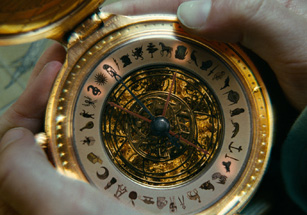Movie Review: The Golden Compass
By Matthew Huntley
January 7, 2007
BoxOfficeProphets.com

As you no doubt already know, "Compass" contains a liberal, anti-authority (namely religion) point of view, and preaches freethinking and open-mindedness in ways that are readily apparent. But, and this is the movie's greatest selling point, it presents its ideas in ways that are fun, exciting and adventurous. I've got to admit, the movie had me. Fantasy is a genre where we become so engulfed by atmosphere and special effects that we often lose sight of the story and dialogue. But "Compass," from writer-director Chris Weitz, is more focused on putting its heavily debated ideals at its forefront.
At the beginning, we're told the universe is made up of many different Earths, each of which has its own set of rules. They are all run by a tyranical board called the Magisterium and a God-like figure known as the Authority. Unlike our own Earth, where souls are believed to live within our bodies, people on this particular Earth live alongside their souls, and are called "daemons". Daemons can shape-shift themselves into a myriad of animals until their human counterparts become adults. It's established that whatever the human or daemon physically feels, the other feels the same.
Within this world lives a curious, spunky little girl named Lyra (Dakota Blue Richards), who has a taste for trouble and an even greater knack for finding it. She lives with her uncle, Lord Asriel (Daniel Craig), at Jordan College in Oxford. Asriel is a modernist and freethinker. He has acquired a picture of a mysterious substance called Dust, which flows into the world from the Arctic sky, and he shows it to his academic scholars while beseeching them for funds to travel north and find Dust's source. This could all lead to the greatest spiritual awakening in history and quite possibly discover answers that would disrupt the Magisterium and Authority's hold on the human race.
Inevitably, Lord Asriel has his fair share of enemies, one of whom is the conniving Mrs. Coulter (Nicole Kidman). She's on a mission to destroy mankind's curiosity about otherworldly things in order to "save" humans from themselves. She takes young Lyra on as her apprentice in order to steer the little girl, who's rumored to be the most important link in a world-changing prophecy. But before she leaves with Mrs. Coulter, the college master gives Lyra an alethiometer, or Golden Compass, to see life's truths. What "truths" Lyra eventually finds I'll let you discover, but I will say they're dark, disturbing and involve children, along with a process called "intercision." Lyra finds herself on a journey to help her uncle and his quest to find life's answers. Among other people and groups, she's aided by a talking armored bear named lorek Byrnison (voice of Ian McKellen), a witch (Eva Green), and an aeronaut (Sam Elliot), who luckily arrives in the nick of time almost everywhere he goes.
The Golden Compass was the first among Pullman's His Dark Materials trilogy, unread by me, but if the movie is any indication, the literature probably has great worth. Pullman has said his books don't promote any one thing, only inspire things like "...kindness, courage, curiosity, open-mindedness." It's easy to see why institutions like the Catholic League would protest its message since it uses God, or an Authority, as a manifestation against free will. Pullman has said he wrote his books at a time when he found no evidence of God. The movie is less talky than the literature, but as is, it doesn't talk specifically about religion, Christ or the Bible. If the studio had more guts, it would have spoken about these things more explicitly, but the movie wants to push the idea of banning restricted thought and making it uniform. That is a valuable agenda. It is perhaps more accurate to say the movie is against the negative ramifications of religion, namely mankind's interpretation of religious sources, and the idea that we should all accept and worship the same way just because we're told to, or else. Man should live freely, be educated and make his own decisions.
Subtext aside, The Golden Compass works extremely well as a compelling action adventure. It has the usual ingredients of its type, including chase scenes, giant battle sequences, distant aerial shots, talking animals, witches, neat-looking inventions, cold locations. You get the idea. The highlight is a pumped up bear fight that pushed an envelope I wasn't expecting it to. Because its ideals plant it in a more subversive, serious context, all of these qualities come to matter as more than just things to look at and admire. They become central components to the story, which is intelligent and thoughtful because it's actually trying to say something and create discourse. When I watch a movie like this, I appreciate its message, but its message is not what makes it a good. A movie can have a horrible message and still be well-made. Fortunately, this movie has a good message and is also well-made, and I guess it better be since it has a reported $180 million production budget. But Weitz uses his resources wisely to envelop us in his world and making us care about the intellectual journeys of his characters. Kidman and Craig are fine as the adult leads, but the real star is Richards, who illuminates Lyra with conviction, energy and enthusiasm. Two more books were published after The Golden Compass - The Subtle Knife and The Amber Spyglass -but New Line has not made any promises to make them. Given how enthralling "Compass" is as a movie, I can only hope it does well enough internationally to greenlight the other installments. Unlike "Potter" and "Narnia," which are good series that I can pretty much leave at any time, "Compass" is one I'm anxiously waiting to see continue. Let's hope it does.